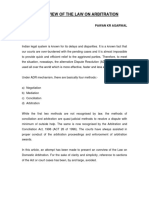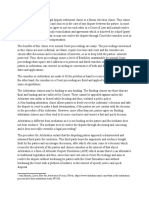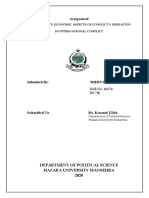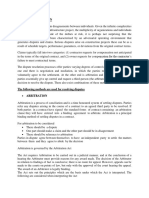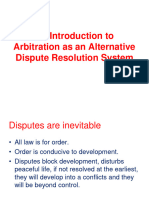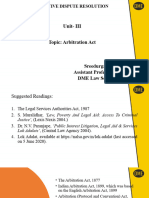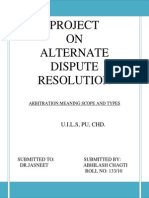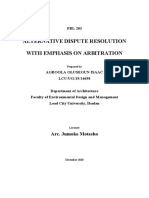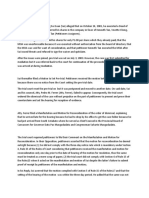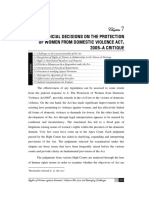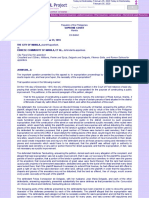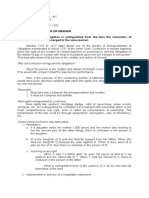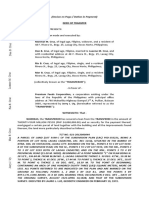ADR SIMULATION EXERCISE UPDATED ONE.
Uploaded by
afzalsarahussainADR SIMULATION EXERCISE UPDATED ONE.
Uploaded by
afzalsarahussainADR SIMULATION EXERCISE FIRST.
I. MEANING OF ARBITRATION-
Arbitration is a method of resolving disputes outside of court, where the parties involved
agree to have their case decided by a neutral third party called an arbitrator (or a panel
of arbitrators). The arbitrator listens to both sides, reviews the evidence, and then makes a
binding or non-binding decision, depending on the agreement between the parties.
Key Features:
• Private: Unlike court trials, arbitration is usually confidential.
• Faster & Cheaper: Often quicker and less expensive than going to court.
• Final Decision: In binding arbitration, the decision is final and enforceable, with very
limited grounds for appeal.
• Flexible: The parties can often choose the rules, location, and even the arbitrator.
II. STEPS IN ARBITRATION PROCEEDINGS.
Arbitration is a private and efficient method of dispute resolution that offers several key
advantages. Unlike court trials, arbitration is confidential, ensuring that sensitive
information remains protected. It is often faster and more cost-effective than litigation,
making it a preferred choice for commercial disputes. In binding arbitration, the decision
made by the arbitrator is final and enforceable, with very limited grounds for appeal.
Moreover, arbitration is flexible, allowing parties to choose the rules, location, and even
the arbitrator, making the process more tailored to their needs.
The arbitration procedure begins with an arbitration agreement. Parties must either include
an arbitration clause in their contract or agree to arbitration after a dispute arises. This
agreement outlines crucial elements such as the scope of disputes covered, the number of
arbitrators, the applicable rules (e.g., UNCITRAL, ICC, or domestic laws), the place (seat)
of arbitration, and the language of proceedings. The process formally starts when one party
sends a Notice of Arbitration to the other, summarizing the dispute, the relief sought, the
arbitration clause, and the proposed arbitrator(s), if applicable. Arbitrators are then
appointed either by mutual agreement, as per the arbitration clause, or by an arbitral
institution or court if the parties cannot agree.
Once the arbitrators are appointed, a preliminary meeting is held to set a timetable, decide
on procedural rules, and clarify the key issues. The claimant then submits a Statement of
Claim detailing the facts, legal arguments, evidence, and relief sought. The respondent
responds with a Statement of Defense and may file a counterclaim. The exchange of
evidence follows, where both parties share relevant documents, witness statements, and
expert reports, sometimes including disclosure or discovery processes. If needed, oral
hearings are conducted, where witnesses are examined and cross-examined, and legal
arguments are presented. After the hearing, parties may submit written summaries of their
arguments. The arbitrator(s) then issue a binding decision called an arbitration award,
which includes findings of fact and law, decisions on claims, and remedies granted, such
as damages or injunctions. The award can be enforced like a court judgment, often under
the New York Convention for international disputes. There are only limited grounds for
challenging or setting aside an award, such as fraud, bias, or lack of jurisdiction. Arbitration
is legally binding under laws like Section 7 of the Indian Arbitration & Conciliation Act,
1996, Article II of the New York Convention, and the U.S. Federal Arbitration Act.
If no arbitration agreement exists, arbitrators may be appointed by an arbitral institution
such as the ICC or LCIA, or by a court, depending on the applicable laws. Arbitrators must
always remain neutral and independent to ensure fairness.
Arbitration can be categorized in several ways. Based on procedure, there are two main
types: institutional and ad hoc arbitration. Institutional arbitration is conducted under the
supervision of an arbitral institution, which provides established rules, administrative
support, and sometimes even appoints arbitrators. Examples include ICC, LCIA, SIAC,
MCIA, HKIAC, and ICADR. In contrast, ad hoc arbitration is not administered by an
institution; parties decide the rules, procedures, and arbitrators themselves, making it more
flexible. It often follows UNCITRAL Arbitration Rules or party-agreed terms.
Arbitration is also classified based on jurisdiction. Domestic arbitration involves disputes
within the same country and is governed by national arbitration laws, such as the Indian
Arbitration & Conciliation Act, 1996. International arbitration occurs when parties belong
to different countries or the dispute has a foreign element. It is governed by international
arbitration rules like ICC Rules, UNCITRAL, and international treaties such as the New
York Convention.
Based on tribunal consent, arbitration may be voluntary or mandatory. Voluntary arbitration
occurs when parties mutually agree to arbitrate, typically through an arbitration clause or a
separate arbitration agreement. Mandatory arbitration, on the other hand, is imposed by
law, leaving parties with no option but to resolve their dispute through arbitration.
The nature of the dispute further classifies arbitration into different categories. Commercial
arbitration deals with business-related conflicts, including trade, contracts, construction,
and partnerships, and is common in both domestic and international trade. Consumer
arbitration involves disputes between consumers and service providers or businesses, often
overseen by consumer protection authorities or arbitration panels. Labor or employment
arbitration relates to disputes between employees and employers, covering issues such as
wrongful dismissal, wage disputes, and working conditions. In some cases, it may involve
unions and collective bargaining agreements.
Arbitration can also be binding or non-binding. In binding arbitration, the arbitrator's
decision is final, conclusive, and legally enforceable, with very limited scope for appeal.
Non-binding arbitration, on the other hand, serves as an advisory process where parties are
not obligated to accept the arbitrator’s decision and may still pursue litigation.
There are also specific types of arbitration designed for different needs. Fast-track
arbitration follows a simplified, expedited process with strict deadlines and limited
hearings, ensuring a quicker resolution. It is recognized under Section 29B of the Indian
Arbitration & Conciliation Act, 1996. Online arbitration, also known as Online Dispute
Resolution (ODR), takes place entirely through digital platforms, making it ideal for e-
commerce, tech-based services, and international contracts. Statutory arbitration is
conducted as required by a specific statute, such as Section 7-B of the Indian Telegraph Act
in India.
Mandatory arbitration is enforced in certain sectors by law. For example, in India, telecom
disputes under the Indian Telegraph Act must be referred to arbitration by the Department
of Telecommunications. In some countries, employment disputes must go through
arbitration before any court proceedings can take place. An example of an arbitration clause
in a joint venture agreement is when both parties agree to resolve disputes through the
London Court of International Arbitration (LCIA) if needed.
Arbitration continues to be a widely accepted method for resolving disputes efficiently,
maintaining confidentiality, and avoiding lengthy litigation. Its flexibility and
enforceability make it a preferred choice for commercial contracts, international trade, and
many other fields requiring effective dispute resolution.
FACTS OF THE CASE
This case revolves around a dispute between Mr. Varun (Contractor) and Mr. Rajeev (Client)
arising from a Construction Agreement executed on 1st January 2024. The contract involved
the construction of a residential house, with a stipulated completion deadline of one year from
the date of execution, i.e., by 31st December 2024 for a total consideration of Rs.1,00,00,000/-
(Rupees One Crore only). Upon execution of the agreement, Mr. Rajeev, paid an advance token
amount of Rs. 25,00,000/- (Rupees Twenty-Five lakhs only) to MR Varun. The agreement
explicitly stated that the remaining balance of Rs 75, 00,000/- (Rupees Seventy-Five Lakhs
only), would only be payable upon completion. It further provided that any failure to complete
the project on time may result in non-payment, as per the arbitration clause. However during
the course of construction, a six-month-long lorry strike severely impacted the availability of
construction materials, coupled with other unforeseen circumstances delayed the progress of
the project.
In light of these delays, Mr. Varun was unable to meet the contractual deadline of 31st
December 2024 and thus formally requested an extension of one more year to complete the
project. Mr. Varun maintains that the delay was caused by factors beyond his control and the
work was being executed in good faith demanding the complete payment, while Rajeev insists
on the strict enforcement of the contract terms arguing that he should not suffer losses due to
the contractor’s inability to complete the work on time. Since the agreement contains an
arbitration clause, the dispute has now been referred to arbitration for resolution.
ARBITRATION AGREEMENT
This Arbitration Agreement is made and entered into on 1st January 2024 at Bengaluru,
Karnataka.
BETWEEN
Mr. Varun, an individual residing at Flat no, 704, Concorde Manhattans Apartment, Neeladri
Nagar, Electronics City Phase 1, Bengaluru, Karnataka 560100, (hereinafter referred to as the
"FIRST PARTY"),
AND
Mr. Rajeev, an individual residing at Flat no 904 , Golden Palm Appartments, Golden Palms
Rd, Narayanapura, Bengaluru, Karnataka 560077 , (hereinafter referred to as the "SECOND
PARTY").
NOW, THEREFORE, the parties agree to the terms and conditions as follows:
1. In respect of the Construction Agreement executed on 1st January 2024, including but
not limited to the existence, validity, meaning and interpretation, enforcement,
operations, performance, non performance, breach, continuance, or termination of the
agreement, the dispute shall be referred to arbitration as per the terms laid further in this
agreement.
2. After a dispute has arisen, either party may demand the arbitration proceedings to
commence in writing within [NUMBER] days, specifying the details of the dispute and
naming an arbitrator.
a. After such a demand has been raised, the other party shall, within [NUMBER]
days, provide details of the arbitrator appointed on their behalf.
b. The two arbitrators so appointed shall select a third arbitrator within [NUMBER]
days, who shall act as the Presiding Arbitrator. In the event that a third arbitrator
is not mutually agreed upon, the third arbitrator shall be appointed by the
Arbitration Committee.
3. The rules and procedures governing the arbitration hearing shall be those of [INDUSTRY
OR ASSOCIATION RULES, IF APPLICABLE]. The law of evidence shall govern the
presentation of evidence at such hearings. The provisions of the Arbitration and
Conciliation Act, 1996, as applicable, shall apply to this arbitration reference.
4. The language of the arbitration hearings shall be English.
5. The proceedings shall be held in Bengaluru, Karnataka, wherein the venue may be
mutually decided upon by the parties or the appointed arbitrators.
6. Nothing contained in this agreement shall be deemed to give the arbitrators any power,
right, or authority to change, amend, modify, add, or alter any provisions as provided in
the Construction Agreement between the parties.
7. This Arbitration Agreement shall serve as a complete defense to any suit, action, or
proceeding instituted in any court or administrative tribunal with respect to any dispute
arising during the period of this agreement and referred to arbitration.
8. Any amendments, additions, or modifications to this agreement or any additional
obligations shall be binding only if in writing and signed by each party.
9. The arbitration provisions of this agreement, concerning any controversy or dispute
requiring arbitration, shall survive the termination or expiration of the Construction
Agreement executed on 1st January 2024.
10. The award rendered by a majority of the arbitrators shall be final and binding on the
parties.
Having agreed to the above provisions, this Agreement is signed on 01/01/2024 at Bengaluru,
and copies have been provided to both parties.
1. [Signature]
Mr. Vikram R, for and on behalf of the FIRST PARTY
2. [Signature]
Mr. Ajay S, for and on behalf of the SECOND PARTY
STATEMENT OF CLAIMANT
Claimant Details:
Varun,
Aged about 38 years,
Flat no, 704, Concorde Manhattans Apartment
Neeladri Nagar, Electronics City Phase 1,
Bengaluru, Karnataka 560100
For the Kind Perusal of:
[Name of Arbitrator]
Arbitrator,
Bengaluru.
I, Varun, do hereby solemnly state and submit the following claims before the Hon’ble
Arbitrator:
That the Claimant respectfully seeks a direction to the Respondent to release the agreed
contract amount of ₹1,00,00,000/- for the residential construction undertaken pursuant to the
Construction Agreement dated 1st January 2024.
That the Claimant further requests this Hon’ble Tribunal to grant a reasonable extension of
time for completion of the remaining construction work, keeping in view the uncontrollable
delays faced due to events such as the prolonged lorry strike and other force majeure
circumstances.
That the Claimant also prays for just compensation towards the financial hardships suffered
as a result of the Respondent’s continued refusal to honour the terms of the agreement and
make timely payments.
That the Claimant further prays for any additional reliefs that the Hon’ble Tribunal may
consider appropriate, just, and equitable under the facts of the present case.
The Claimant affirms that all obligations under the contract have been performed in good
faith, and that the delays were duly notified to the Respondent in accordance with the agreed
provisions. The Claimant submits that such delays were beyond his control and requests that
the Tribunal consider these bona fide circumstances while deciding the present claims.
Bengaluru
Dated: ____________
Varun
(Signature)
Claimant
LIST OF DOCUMENT
1. Building Construction Contract
2. Transaction Receipt
3. Legal Notice
Filed in Arbitral Court
At
Date: / /2025
Advocate for Applicants
BUILDING CONSTRUCTION CONTRACT.
This Agreement is executed on this 1st day of January, 2024, between:
Mr Rajeev, son of Shri ____________________, residing at
_____________________________ (hereinafter called “the Owner”, which term shall, unless
the context otherwise admits, include his heirs, executors, administrators, legal
representatives, nominees and assigns), party of the first part
AND
Mr Varun, a civil contractor, having his principal place of business at
_____________________________ (hereinafter called “the Contractor”, which term shall,
unless repugnant to the context, include his successors, legal representatives, executors,
administrators and assigns), party of the second part.
WHEREAS:
1. The Owner is the absolute owner in possession of a plot of land measuring ________
sq. meters situated at ______________________________, more particularly
described in Schedule I hereto.
2. The Owner has approached the Contractor to construct a residential house upon the
said land according to the approved architectural drawings sanctioned by the
competent municipal authority.
3. The Contractor has agreed to construct the residential house in accordance with the
specifications detailed in Schedule II, subject to the terms and conditions hereinafter
appearing.
NOW THIS AGREEMENT WITNESSETH AS FOLLOWS:
1. Scope and Timelines
The Contractor shall commence and complete the construction of the residential house within
a period of 12 (twelve) months from the date of this Agreement, i.e., on or before 31st
December 2024, using best quality materials and in accordance with the approved plan and
specifications mentioned in Schedule II.
2. Contract Price and Payment Terms
(a) The total contract amount shall be Rs 1,00,00,000/- (Rupees One Crore only), payable by
the Owner to the Contractor only upon full and satisfactory completion of the construction.
(b) No part-payment, advance, or installment shall be made during the progress of the work.
(c) The entire payment shall be released by the Owner only upon issuance of Completion
Certificate by the relevant municipal authority.
3. Extension Due to Force Majeure
If the Contractor is unable to complete the work within the stipulated time due to
circumstances beyond his control, including but not limited to natural disasters, lorry
strikes, shortage of materials, labor unrest, epidemics, or acts of government, the
Contractor shall notify the Owner in writing.
Upon such notification and verification, the Owner may, at his discretion, grant an extension
of time but shall not be bound to provide additional compensation.
4. Time is of the Essence
It is expressly agreed by the parties that time is the essence of this Agreement. However,
genuine delays caused by unforeseen or force majeure events may be considered for
reasonable extension upon mutual consent.
5. Specifications and Materials
The Contractor shall follow the material and construction specifications as outlined in
Schedule II. No deviation from approved specifications shall be made without prior written
consent of the Owner or his Architect.
6. Inspection Rights
The Owner and/or his appointed architect shall have the right to visit the site and inspect the
construction work at all reasonable times.
7. Risk and Responsibility
All construction materials, tools, equipment, and partially completed works shall remain at
the sole risk and responsibility of the Contractor until the final handover of the Project.
8. No Possession Without Completion
The Owner shall not be bound to accept possession of the residential house or make any
payment unless the construction is completed in full compliance with this Agreement, and
requisite occupancy/completion certificates are obtained.
9. Additional Works
Any request for additional or modified works by the Owner shall be made in writing, and cost
adjustments shall be agreed upon separately in advance before execution of such work.
Dispute Resolution & Arbitration
1. Any dispute, controversy, or claim arising out of or in relation to this Agreement shall
be resolved by arbitration, as per the provisions of the Arbitration and Conciliation
Act, 1996.
2. A sole arbitrator shall be appointed mutually by both parties.
3. The place of arbitration shall be [insert city], and the arbitration shall be conducted in
English.
4. The arbitral award shall be final and binding on both parties and shall be enforceable
as a decree of court.
5. This Agreement shall be governed by the laws of India, and the courts at [insert
jurisdiction city] shall have exclusive jurisdiction over matters not covered by
arbitration.
SCHEDULE I
Details of the Property
• Plot No.: ____________
• Street: _______________
• Road: _________________
• Area: ________________ sq. meters
• Bounded by:
o East: ____________________
o West: ____________________
o North: ___________________
o South: ___________________
• Within the district of: ___________
SCHEDULE II
Specifications of Work
1. Structure: RCC framed structure with standard depth foundation, cement mortar
walls, and waterproof plastering.
2. Doors & Windows: Premium quality teak wood for all main doors and window
frames. Steel or aluminum window grills and glass panels.
3. Flooring: Vitrified tile flooring in all rooms, anti-skid ceramic tiles in bathrooms and
balconies.
4. Paint & Finish: Emulsion paint interiors, exterior-grade waterproof paint on exteriors.
5. Electricals: Concealed copper wiring, modular switches, standard provisions for
lighting, fans, geysers, and air conditioning.
6. Plumbing & Sanitation: Branded CP fittings, wall-hung sanitary ware, and water
supply from borewell and overhead tank.
7. Kitchen: Marble/Granite countertop, stainless steel sink, wall tiles up to 2 ft above
counter.
IN WITNESS WHEREOF, the parties afore-mentioned have signed this deed in token of
acceptance of the terms thereof
SIGNED AND DELIVERED by the within named
MR Rajeev
the party hereto of the First Part (owner)
in the presence of ……………………..
1. Name: ______________________
Address: ____________________
Signature: ___________________
2. Name: ______________________
Address: ____________________
Signature: ___________________
MR Varun
the party hereto of the Second Part (Contractor)
in the presence of ……………………..
1. Name: ______________________
Address: ____________________
Signature: ___________________
2. Name: ______________________
Address: ____________________
Signature: ___________________
RECEIPT
Received a sum of Rs. 25,00,000/- (Rupees Twenty-Five lakhs only) from the MR
RAJEEV, as an advance token amount for the construction of residential house by
Cheque, as agreed upon in the Agreement.
I SAY I RECEIVED
Rs. 25,00,000/-
(CONTRACTOR)
MR Varun
Witness:
in the presence of ……………………..
3. Name: ______________________
Address: ____________________
Signature: ___________________
4. Name: ______________________
Address: ____________________
Signature: ___________________
ADV. MRS. SAEE PATIL ( BBA. LL.B.)
ADVOCATE AND NOTARY PUBLIC
OFFICE : 1381/100/93, NEELADRI RD, OPPOSITE AJMERA INFINITY, NEELADRI NAGAR,
ELECTRONICS CITY PHASE 1, DODDATHOGURU, BENGALURU, KARNATAKA 560100
MOB: 9826854690 ,EMAIL.ID : [email protected]
-------------------------------------------------------------------------------------------------------
LEGAL NOTICE
Under Section 8 of the Arbitration and Conciliation Act, 1996
Dated: [Insert date]
From:
Varun
S/o Shri _____________
Civil Contractor
Flat no, 704, Concorde Manhattans Apartment
Neeladri Nagar, Electronics City Phase 1,
Bengaluru, Karnataka 560100
To:
Rajeev
S/o Shri _____________
Flat no 904 , Golden Palm Appartments,
Golden Palms Rd, Narayanapura,
Bengaluru, Karnataka 560077
Subject: Legal Notice for Recovery of ₹1,00,00,000/- (Rupees One Crore only) for
Completion of Construction Work Under Agreement dated 01.01.2024
Dear Sir,
Under instructions and on behalf of my client, Mr. Varun, Civil Contractor, I hereby address
you as follows:
1. That you and my client entered into a Building Construction Contract dated 1st
January 2024 for the construction of a residential house on your property situated at
_______________________________.
2. That the contract amount agreed upon was Rs 1,00,00,000/- (Rupees One Crore only),
to be paid upon full completion of the construction work and issuance of Completion
Certificate.
3. That the advanced token amt of Rs 25, 00,000/- (Rs twenty-five lakh only) was paid
by you and the same has been acknowledged by my client.
4. That the period stipulated for completion was 12 months, i.e., on or before 31st
December 2024. However, due to force majeure circumstances, including a
prolonged lorry strike lasting over 6 months, shortage of materials, and other
unforeseen logistical issues, the work was delayed. These events squarely fall under
Clause 3 of the contract which permits extension due to uncontrollable events.
5. My client duly notified you in writing during the period of disruption, as required
under the said clause, and despite no formal reply from your side, my client continued
and completed the construction work in full compliance with the agreed
specifications and standards under Schedule II of the contract.
6. Upon completion, my client has fulfilled all obligations, and the site is ready for
possession. However, you have failed and neglected to release the agreed payment of
the remaining Rs 75, 00,000/-, despite repeated oral and written requests.
7. The delay in payment is illegal, unjustified, and a clear breach of contract on your
part. The contractual condition of “payment only upon full completion” stands
fulfilled.
8. My client is entitled to the entire contract amount along with interest @12% p.a.
from 1st January 2025 (completion date) till the date of actual realization.
Under these circumstances and in the view of the above facts, my client is requesting you to
not only pay the sum of Rs 75, 00,000/- (Rupees Seventy-five lakh only) agreed but also pay
an additional interest @12% p.a. from 01.01.2025 till the date of payment for the same. If
within 15 (fifteen) days of receiving from the date of receipt of this notice you don’t pay the
due amount with the additional interest, my client shall be constrained to initiate arbitral
proceedings under Clause [insert clause number—usually at the end] of the Agreement and
the Arbitration and Conciliation Act, 1996, at your sole risk as to costs and consequences.
This notice is without prejudice to any other rights and remedies available to my client under
law or equity.
Yours faithfully,
(Signature)
Mrs. Saee Patil
[+919826854690 ]
Statement of the Defence
Respondent Details:
Rajeev,
Aged about 49 years,
Flat no 904 , Golden Palm Appartments,
Golden Palms Rd, Narayanapura,
Bengaluru, Karnataka 560077
For the Kind Perusal of:
[Name of Arbitrator]
Arbitrator,
Bengaluru.
I, Rajeev, do hereby solemnly state and submit the following points of defence before the
Hon’ble Arbitrator:
1. That the Respondent respectfully prays for the dismissal of the Claimant’s monetary
claim, as the terms and milestones outlined in the contract have not been duly fulfilled
by the Claimant.
2. That the Respondent objects to the Claimant’s request for extension of time, in view
of the express terms of the agreement that required timely completion of the work.
3. That the Respondent seeks appropriate relief for the financial loss, inconvenience, and
opportunity cost caused due to the delay in execution on part of the Claimant.
4. That the Respondent prays for any other reliefs as the Hon’ble Tribunal may deem fit,
just, and proper in the present circumstances.
The Respondent submits that all actions have been taken in good faith and in reliance on the
terms agreed upon in the contract. In light of the breaches committed by the Claimant, the
Respondent respectfully requests that the claims be rejected and the necessary reliefs granted
in favour of the Respondent.
Bengaluru
Dated: ____________
Rajeev
(Signature)
Respondent
ISSUE
1) Whether the delay in project completion was beyond the claimant’s control ?
2) Whether the withholding of payment by the respondent is justified on the basis of contract
terms ?
3) Whether the claimant is entitled to full payment despite the breach of the completion
deadline ?
4) Whether force majeure principles apply to this case ?
STATEMENT OF CLAIM AND DEFENCE
ARGUMENTS ON BEHALF OF CONTRACTOR.
1. Delay Due to Force Majeure / Frustration of Contract
• The six-month lorry strike was an unforeseen, uncontrollable, and industry-wide
disruption, causing delays in delivery of construction materials.
• As per Section 56 of the Indian Contract Act, 1872, a contract becomes void when
its performance is rendered impossible due to an unforeseeable event.
• Satyabrata Ghose v. Mugneeram Bangur & Co. (AIR 1954 SC 44)
The Supreme Court held that if an event frustrates the contract or makes
performance impossible, the contract is discharged. It recognized commercial
impossibility as valid in some situations.
• Alopi Parshad & Sons Ltd. v. Union of India (AIR 1960 SC 588)
The court emphasized that extraordinary events beyond control that disturb the basis
of the contract may justify deviation from strict performance.
2. No Fundamental Breach – Willingness to Perform
• Varun was not in repudiatory breach of the contract. Instead, he made continuous
efforts to perform and requested an extension in good faith.
• There is no clause in the agreement explicitly stating time as the essence of the
contract.
• M.C. Chockalingam v. Mangilal (AIR 1969 SC 387)
The Supreme Court held that mere delay does not amount to breach unless time is of
the essence and delay causes prejudice.
3. Doctrine of Substantial Performance
• A major part of the construction has been completed. Non-payment of the full contract
amount of ₹1 crore would result in unjust enrichment of Rajeev.
• The doctrine of substantial performance entitles a contractor to proportional
compensation even if there is delay or partial deviation.
• Hoenig v. Isaacs (1952) 2 All ER 176
It was held that substantial completion entitled the contractor to payment subject to
deductions for minor defects.
• R.L. Kalathia v. State of Gujarat (2011) 2 SCC 400
The court acknowledged that genuine work performed should be compensated even
if there were contractual breaches.
4. Principle of Good Faith and Equity
• Varun’s conduct shows intent to perform and transparency. Rajeev’s refusal to pay
is disproportionate and inequitable.
• Section 73 of the Indian Contract Act entitles compensation for the work done.
Arguments on Behalf of Rajeev (Client)
1. Time Was of the Essence
• The contract clearly states that the project must be completed within one year, failing
which payment may be withheld.
• Delay affects not only financial planning but the residential purpose of the house.
• Hind Construction Contractors v. State of Maharashtra (1979 AIR 720)
Held that if time is expressly or impliedly of the essence, and the contractor fails to
complete on time, the employer can refuse payment or rescind the contract.
• Kailash Nath Associates v. DDA (2015) 4 SCC 136
Emphasized the need to honor express terms of the contract.
2. Express Terms Govern Over Equity
• The parties voluntarily agreed that payment would be made only after timely
completion.
• The contractor's reliance on equitable doctrines cannot override specific contractual
conditions.
• General Assurance Society v. Chandmull Jain (AIR 1966 SC 1644)
Where the court held that express contractual terms will override any general notions
of fairness or commercial convenience.
3. Risk of Delay Was Foreseeable and Not Excused
• Strikes and transport issues are not entirely unforeseeable in construction contracts. A
prudent contractor should have accounted for contingencies.
• Varun did not timely invoke any force majeure clause, nor did he seek Rajeev’s
formal consent before delaying the timeline.
4. Breach of a Condition Precedent to Payment
• Completion within one year was a condition precedent to payment. Since that
condition wasn’t fulfilled, the right to payment does not arise.
• Union of India v. Chaman Lal Loona & Co. (AIR 1957 Punjab 248)
Held that if payment is conditional upon completion of certain work, and that is not
completed, no payment is due.
CLAIMANT PRAYER
In light of the facts and circumstances stated above, and the submissions made before this
Hon’ble Tribunal, the Claimant most respectfully prays for the following reliefs:
1. That this Hon’ble Tribunal be pleased to recognize that the delay in completing the
construction project was due to unforeseen and unavoidable circumstances, including
the six-month lorry strike and other extraneous factors beyond the Claimant’s control.
2. That this Hon’ble Tribunal be pleased to grant an extension of one (1) additional year
for the completion of the construction project in light of the unforeseen circumstances,
without penalty or forfeiture of payment.
3. That this Hon’ble Tribunal be pleased to direct the Respondent to release the full
payment of ₹1 crore as per the contractual agreement upon the completion of the project
within the extended timeline.
4. That this Hon’ble Tribunal may be pleased to pass such other and further reliefs as it
may deem just and proper in the interest of justice and equity.
The Claimant humbly submits that the present prayers are made in good faith and in accordance
with the principles of fairness and contractual obligations.
Date:
Place:
OBSERVATIONS OF THE ARBITRATOR
The arbitration clause in the Construction Agreement dated 1st January 2024 is valid and
enforceable. Both parties have submitted to arbitration as per the agreed dispute resolution
mechanism. The contract required the Claimant to complete construction within one year, with
payment of ₹1 crore conditional on completion. Also, ₹25,00,000 was given as a token amount.
Non-completion could result in non-payment.
The Claimant failed to meet the deadline, citing a six-month lorry strike and other reasons, and
has requested a one-year extension. The Respondent refused, insisting on strict adherence to
the contract. The tribunal must assess whether the lorry strike qualifies as a force majeure event
and if the Claimant took reasonable mitigation steps. Any further delay must also be justified.
While the Respondent has the right to enforce the contract, the tribunal must consider whether
equitable relief is warranted. If the delay was genuinely unavoidable, a reasonable extension
or partial relief may be considered. The tribunal will also assess the extent of work completed
and whether partial payment is justifiable. If the Respondent suffered financial loss,
compensation or liquidated damages may be evaluated.
The tribunal will examine evidence, contractual clauses, industry standards, and legal
principles. Both parties may be required to submit additional documents. A final award will be
rendered based on a fair and reasoned assessment.
Date:__________
Place: ___________
(Arbitrator’sName)
Arbitrator
Arbitral Award
Before the Sole Arbitrator
Bangalore
Case No. _________
Varun ………..
Claimant
Aged 40 years
R/o, Tirupalya, Govt. Hospital Road,
Bengaluru – 99
V/S
Rajeev ………….Respondent
Aged 45 years
R/o, # 44, Venkatadri Nilaya,
Bengaluru – 65
This is the award by the undersigned, made on ________ day of ________ 2025
1. As the arbitrator in this dispute , I rule that Varun ( the Contractor ) is entitled to partial
payment of Rs. 50 lakhs for the work completed, subject to certain conditions outlined
below. This decision balances the contractual obligations and the unforeseen
circumstances that caused the delay.
2. A partial payment of Rs. 50 lakhs reflects a fair compensation, acknowledging both the
breach of timeline and the work completed.
Conditions:
a) Varun must complete the project within the extended timeline of one year from
today.
b) Rajeev will release the remaining Rs. 50 lakhs upon satisfactory completion of the
project.
c) This decision ensures fairness while upholding key contractual principles and
addressing unforeseen circumstances pragmatically.
I award and direct that the fee of the Arbitrator Rs. 15,000/- shall be borne and paid by both
the parties equally.
Date:
______________
Arbitrator
You might also like
- Anatomy of Constitution - Activities - Fillable (1) Answer Key0% (1)Anatomy of Constitution - Activities - Fillable (1) Answer Key2 pages
- Arbitration Economic Aspects of Conflict Mediation in International ConflictNo ratings yetArbitration Economic Aspects of Conflict Mediation in International Conflict27 pages
- Alternative Dispute Resolution: Informal Litigation SystemNo ratings yetAlternative Dispute Resolution: Informal Litigation System22 pages
- Introduction To Arbitration As An Alternative Dispute Resolution ProcessNo ratings yetIntroduction To Arbitration As An Alternative Dispute Resolution Process7 pages
- What Do You Understand by Arbitration? What Are The Objectives of The Arbitration Act? What Are The Essentials For Arbitration Agreement?100% (2)What Do You Understand by Arbitration? What Are The Objectives of The Arbitration Act? What Are The Essentials For Arbitration Agreement?2 pages
- Alternative Dispute Resolution With Emphasis On Arbitration: Arc. Jumoke MoteshoNo ratings yetAlternative Dispute Resolution With Emphasis On Arbitration: Arc. Jumoke Motesho11 pages
- Arbitration: Jump To Navigation Jump To SearchNo ratings yetArbitration: Jump To Navigation Jump To Search4 pages
- Mcle-Updates and Trends in International Adr1100% (2)Mcle-Updates and Trends in International Adr1120 pages
- 03 - Abstract HTTPHDL - Handle.net10603180576No ratings yet03 - Abstract HTTPHDL - Handle.net1060318057619 pages
- Project On Arbitration and Conciliation Act, 1996 - Arbitral AwardNo ratings yetProject On Arbitration and Conciliation Act, 1996 - Arbitral Award17 pages
- Understanding Commercial Real Estate Contracts: Commercial Real Estate Transactions Guide, #2From EverandUnderstanding Commercial Real Estate Contracts: Commercial Real Estate Transactions Guide, #2No ratings yet
- Keys-Pro to Commercial Dispute Resolution and Arbitration: Keys-Pro to Business Law Series, #9From EverandKeys-Pro to Commercial Dispute Resolution and Arbitration: Keys-Pro to Business Law Series, #95/5 (1)
- 1.General Principles Transfer of property Act-y 1-5No ratings yet1.General Principles Transfer of property Act-y 1-525 pages
- Unit 1-ENTREPRENEURIAL MANAGEMENT (1) (2)No ratings yetUnit 1-ENTREPRENEURIAL MANAGEMENT (1) (2)140 pages
- The 14 Questions President Murmu Has Asked the SCNo ratings yetThe 14 Questions President Murmu Has Asked the SC10 pages
- Sexual Slavery and The Comfort Women of World War IINo ratings yetSexual Slavery and The Comfort Women of World War II16 pages
- Filing A Fair Housing Complaint Fact SheetNo ratings yetFiling A Fair Housing Complaint Fact Sheet2 pages
- Heirs of The Late Nestor Tria v. Atty. Epifania Obias100% (1)Heirs of The Late Nestor Tria v. Atty. Epifania Obias3 pages
- Offences and Penalties Relating To Trade MarksNo ratings yetOffences and Penalties Relating To Trade Marks9 pages
- City of Manila V Chinese Community of Manila G.R. No. L-14355No ratings yetCity of Manila V Chinese Community of Manila G.R. No. L-1435511 pages
- Wine Master Cellars, LLLP v. Apex Wine Cellars and Saunas Et. Al.No ratings yetWine Master Cellars, LLLP v. Apex Wine Cellars and Saunas Et. Al.10 pages



